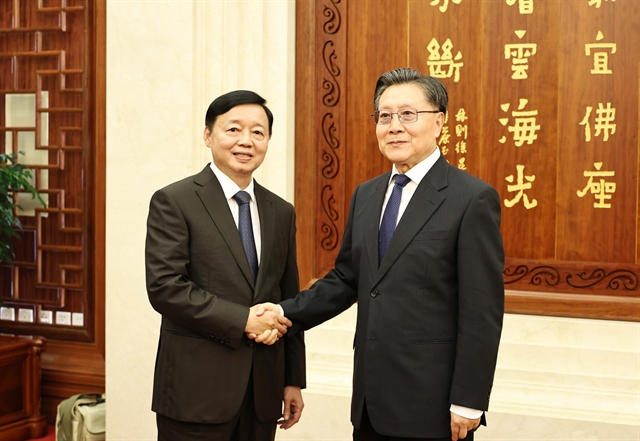 Politics & Law
Politics & Law


|
| Deputy Prime Minister Trần Hồng Hà meets Wang Dongming, Vice Chairman of the Standing Committee of the National People's Congress of China, in Yunnan on Wednesday. — VNA/VNS Photo Công Tuyên |
HÀ NỘI — Deputy Prime Minister Trần Hồng Hà proposed Việt Nam and China prioritise infrastructure cooperation, especially in the railway sector, at his meeting on Wednesday with Wang Dongming, Vice Chairman of the Standing Committee of the National People's Congress of China.
Hà, who is on a working visit to China's Yunnan Province for bilateral activities and attendance at the 9th China–South Asia Expo and the 29th Kunming Import and Export Fair, affirmed Việt Nam’s consistent policy of giving top priority to its relationship with China.
He suggested the two sides work closely in the time ahead to organise mutual high-level visits, including exchanges between the leaders of the two countries’ legislative bodies.
He called for the early commencement of the Lào Cai–Hà Nội–Hải Phòng railway line, technology transfer, training of human resources in railway operations, and the development of a railway industrial complex.
The Deputy PM also recommended the two countries to promote bilateral trade in a balanced and sustainable manner, with China continuing to open its market to more Vietnamese agricultural and aquatic products, and coordinating in developing smart border gates, cross-border economic cooperation zones, and enhancing collaboration in power grid connectivity.
At the meeting, both sides expressed their delight at the socio-economic development achievements each country has attained in recent years, and highly valued the positive momentum and outcomes in Việt Nam–China relations.
They especially noted the regular high-level exchanges, strong growth in trade, investment, and tourism cooperation, significant progress in strategic and transport connectivity, particularly in railways, and the vibrant locality-to-locality cooperation and people-to-people exchanges.
Hà expressed his hope that cooperation in science and technology, agriculture, and natural resources would emerge as new focal points and engines of growth in Việt Nam–China relations.
He urged both sides to enhance national-level collaboration on key technologies, promote cooperation in training science and technology human resources, expand cooperation in hi-tech agriculture, and facilitate mutual recognition of testing and quarantine results.
He also proposed stronger coordination in addressing urban air pollution, disaster risk reduction, climate change response, and environmental protection.
Emphasising the importance of people-to-people exchanges, the Deputy PM called for deeper interactions among young people, scientists, and entrepreneurs to further strengthen the firm social foundation of the bilateral relationship.
In response, Wang welcomed and endorsed Hà's proposals, reaffirming that Việt Nam remains a priority in China’s neighbourhood diplomacy.
He reiterated China’s steadfast support for Việt Nam’s pursuit of socialism in line with its national circumstances and expressed readiness to work closely in realising high-level common perceptions.
China also welcomes future visits and exchanges, and promotes legislative cooperation, particularly in areas such as Party building, law-making, and supervision, thereby laying a solid legal foundation for the development of China-Việt Nam community with a shared future.
Wang additionally affirmed China’s commitment to advancing economic and trade ties, expanding imports from Việt Nam, enhancing transport connectivity, and promoting high-quality investment.
He also voiced support for expanding cooperation in science and technology, artificial intelligence, digital economy, environmental protection, commercial aircraft and power grid connectivity, contributing to the sustainable growth of both nations. — VNA/VNS




